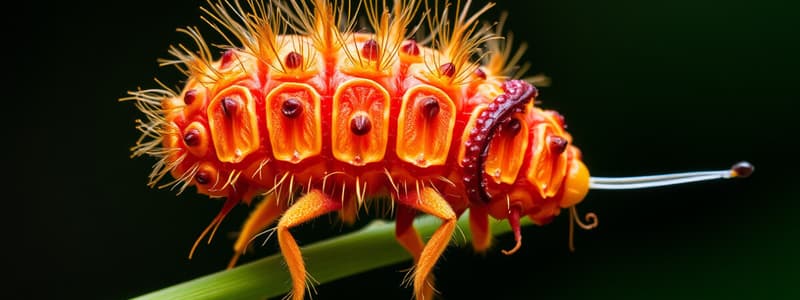Podcast
Questions and Answers
What is the primary focus of biology as a natural science?
What is the primary focus of biology as a natural science?
- The development of biotechnology applications
- The study of chemical reactions in organisms
- The analysis of Earth's geological processes
- The study of life and living organisms (correct)
What level of organization is characterized by several different tissues working together to form specific functions?
What level of organization is characterized by several different tissues working together to form specific functions?
- Tissue level
- Organism level
- Cell level
- Organ level (correct)
Which of the following is NOT considered a level of biological organization?
Which of the following is NOT considered a level of biological organization?
- Molecules
- Fractals (correct)
- Tissues
- Organs
Which of the following is NOT a characteristic of a community?
Which of the following is NOT a characteristic of a community?
Which statement about emergent properties is true?
Which statement about emergent properties is true?
Which example illustrates a unicellular organism?
Which example illustrates a unicellular organism?
Which of the following elements constitutes the largest percentage of the human body?
Which of the following elements constitutes the largest percentage of the human body?
What is the significance of studying atoms and molecules in biology?
What is the significance of studying atoms and molecules in biology?
What defines the population level in biological terms?
What defines the population level in biological terms?
At which level of biological organization are systems comprised of multiple organs?
At which level of biological organization are systems comprised of multiple organs?
Which system is involved with functions such as communication and sensory activities?
Which system is involved with functions such as communication and sensory activities?
How does biological study utilize the conceptual hierarchy of life?
How does biological study utilize the conceptual hierarchy of life?
Which of the following best describes cellular level organisms?
Which of the following best describes cellular level organisms?
Where can life be found on Earth?
Where can life be found on Earth?
Which organ performs the function of water and mineral absorption?
Which organ performs the function of water and mineral absorption?
What is true about organs within organ systems?
What is true about organs within organ systems?
Flashcards are hidden until you start studying
Study Notes
Definition of Biology
- Biology is the natural science that studies life and living organisms, encompassing their structure, function, development, interactions, evolution, distribution, and taxonomy.
Relationship with Other Disciplines
- Biology interrelates with various scientific fields, enhancing understanding and collaborative research.
Levels of Study in Biology
- Biology can be examined on multiple hierarchical levels, from atoms to entire ecosystems, reflecting the complexity of life.
Existence of Life on Earth
- Life thrives in diverse environments, from polar regions to equatorial zones, indicating its adaptability.
Size Range of Organisms
- Organisms vary drastically in size, from microscopic single-celled algae to towering trees measuring over 115 meters.
Hierarchical Organization in Biology
- Biological organization ranges from small-scale atomic levels to large-scale biospheric levels:
- Atoms
- Molecules
- Cells
- Tissues
- Organs
- Organ Systems
- Organisms
- Populations
- Communities
- Biosphere
Emergent Properties
- Each level of biological organization exhibits unique emergent properties not present in the constituent parts, emphasizing the concept of complexity.
Atomic Level
- Atoms represent the foundational level of biology; the arrangement and types of atoms affect biological structure and function.
- Six essential elements constitute about 99% of the human body's composition:
- Oxygen (65%)
- Carbon (18%)
- Hydrogen (10%)
- Nitrogen (3%)
- Calcium (1.5%)
- Phosphorus (1.0%)
Molecular Level
- Molecules, formed from bonded atoms, are vital for biological functions, including proteins, carbohydrates, lipids, nucleic acids, hormones, and enzymes.
Cellular Level
- Cells are recognized as the basic units of life; organisms can be unicellular (e.g., Amoeba, Euglena).
Tissue Level
- Tissues consist of grouped cells working together for similar functions, such as muscle, blood, xylem, and epithelium.
Organ Level
- Organs are complex structures formed from various tissues, performing specific functions (e.g., photosynthesis in leaves, blood circulation by the heart).
Organ System Level
- Organ systems are groups of organs that cooperate to achieve common physiological goals (e.g., digestive, circulatory, and reproductive systems).
Organism Level
- An organism is a self-contained entity, which may be unicellular or composed of multiple cells organized into tissues and organs.
Population Level
- A population is a collection of organisms of the same species residing in a specific geographical area and capable of interbreeding.
Community Level
- A community includes multiple populations of different species interacting within a shared environment, forming a complex biological network.
Studying That Suits You
Use AI to generate personalized quizzes and flashcards to suit your learning preferences.




